Existing User Log In
New User Registration
Register for a free account to gain full access to the VGChartz Network and join our thriving community.



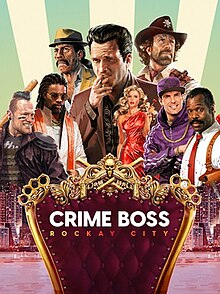

America - Front
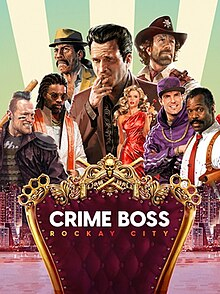

America - Back

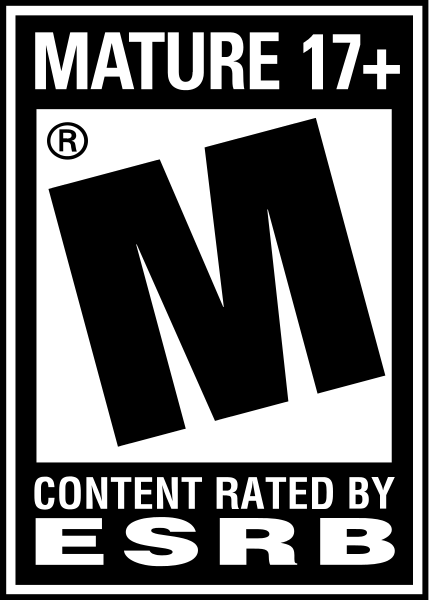
Ingame Studios
Shooter
 (Add Date)
(Add Date) (Add Date)
(Add Date) (Add Date)
(Add Date)
| Owners: | 0 |
| Favorite: | 0 |
| Tracked: | 0 |
| Wishlist: | 0 |
| Now Playing: | 0 |
From the outset, Crime Boss: Rockay City seemed like an enigma. Its clumsy announcement at The Game Awards had the same furor as a funeral the longer Michael Madsen spoke on stage, and the first trailer followed suit. The selling point was this: imagine various 90s Hollywood stars thrown into a first-person shooter. The promos slanted Madsen's character, protagonist Travis Baker, as this hardcore badass with a charm rating of over 16.3 GigaBonds. That's helpful info since I wouldn't have noticed otherwise. That's also a perfect encapsulation of the game proper. Ingame Studios tries crafting a well-blended shooter shake with the attitude of De Palma, Tarantino, and more, yet only finds an unearned sense of accomplishment.
This attitude is informed right after the opening tutorial. Somehow, Baker and his goons are surrounded by cops after a botched robbery. Bullets are whistling past their ears, SWAT teams are setting up for an assault, and their 2nd-floor rooftop cover is bound to be overrun. The context for this – whether it's an in media res opening or nightmare scenario – is largely irrelevant. Just kill some cops, take the loot, and listen to a bunch of bland insults in between headshots. Once this random "mission" is finished, the main thrust of the campaign starts. The King of Discount Miami Rockay City has been… explosively toppled. Whether done by his right hand or someone else is of no concern to you; all that matters is there's a crown to be captured.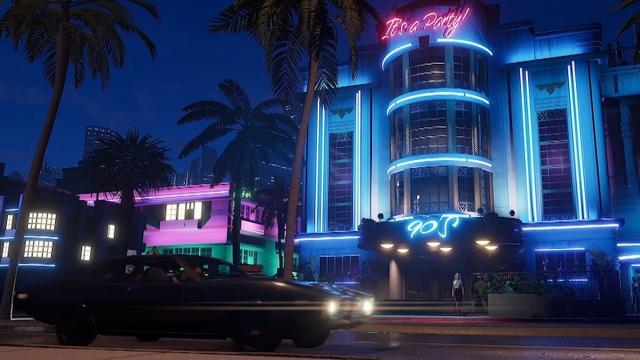
I'd be remiss to say there is no story, or a cluster of mini-stories in this case, but the game orients importance elsewhere. At the start of each day, Baker is at his office room, his club, or the Rockay City map room. There are thirty turfs in total and four other color-coded gangs vying for control. Given that Crime Boss is also a roguelike, who controls what shifts between different playthroughs. It's immaterial anyways since a select few spots are blank at the start, open for anyone with foot soldiers to secure them.
At first, you start out humbly amassing territory and earning a modest daily allowance from drugs (or "candy" as Baker constantly says). As your reputation slowly blossoms, two disparate tiers expand: more standard foot soldiers can be purchased per day and a wider variety of playable team members can be hired. Whereas soldiers are playable cannon fodder for turf wars, special team members can become your player-character or AI companions for other missions. While you don’t have to play as or bring Baker (barring story missions), he's occasionally required to score a full three-star rating on side objectives and necessary to level up your Boss Level, a permanent stat-buff itinerary that carries over between campaign runs. His untimely death also resets the campaign, so there's a tangible risk/reward system. 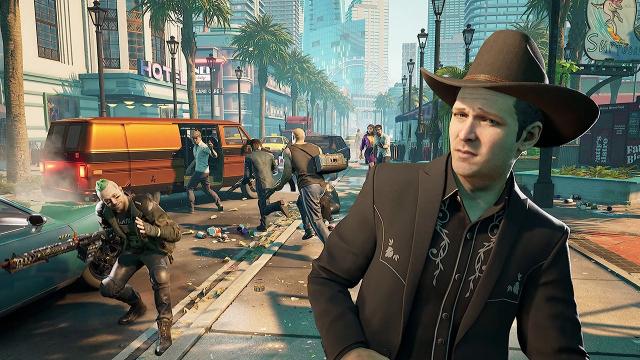
As comfortably as these rules (and more) mesh together, it's hard to seem salvageable with insipid shooting mechanics. Recall the description for the opening: gunning down police waves. Aside from being randomly plopped there, another reason this feels so jarring is the laggard and wonky gun movement. How in the hell in the year 2023 AD do two of the most commercially-prominent shooters fumble these basics? To give it a thimble of credit over Redfall, there is a performance mode at launch – albeit with quite an inconsistent 60fps. But similarly to Hot Topic Borderlands, I think why it has such limited sensitivity settings stems from the cost to framerate. Stepping past that, it feels so lifeless in several other respects: wonky recoil, bland animations, poor shooting kinaesthetics, and so on. Think Great Value Payday.
Outside of shooting, Payday is a fitting North Star for its heists too. Even if your gang doesn't currently hold the turf, varied heist missions are scattered across the map. These robberies come in several shapes and sizes: strip malls, armored trucks, warehouses, jewelry stores, banks, and a few special story-connected locations. Even with slight tweaks between them, you'll immediately get used to each repetitive variant. Stealth-first missions hit the expected flow: lockpick your way to the back alley, break a pesky camera or two, and then turn them all off at the mainframe. You'll likely have to subdue and ziptie a couple of patrolling guards, but that's also a non-issue so long as you have the jump when threatening them. Given how threadbare and weird the AI acts during stealth, everything becomes a bland routine. What's funny is since their detection is relegated to vision and/or audio meters filling up, all actions short of firing an unsilenced gun don't matter. Hell, guards don't investigate suspicious sightings even if you do jumping jacks out in the open, so long as you're quick to hide.
Should the heist go south, events unfold with predictable results: a GTA-style star rating that increases the longer you stick around. Although the combat AI isn't a slouch (for police and gang members), it's hard to cede much credit when Ingame's version of competency is dropping them wherever convenient, sometimes materializing from the ether, and they instantly laser you or your teammates. That may appear akin to playing any old shooter on Hard, but it reaches a different threshold when tied with vomiting enemies off-screen and inconsistent friendly AI. It technically works, but only in the sense of disregarding tempo and level design altogether. 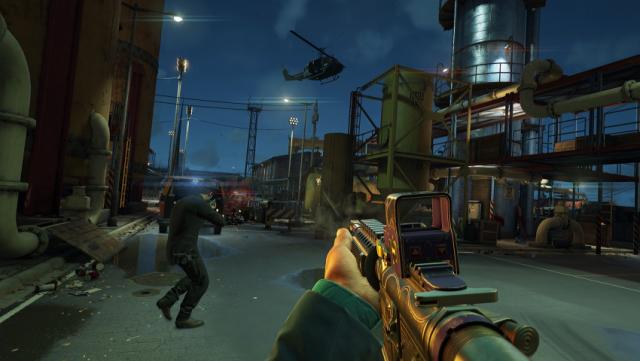
Part of why that quality irks me is – admittedly – losing Baker a couple of times. The consequences of his first death caught me off-guard, and the second time came from Sherriff Chuck Norris' full police meter resulting in forcibly playing as Baker against a high-level police swarm with only one team member as back-up (for some reason). After reaching around 75% campaign completion the second time, I simply wasn't interested in humoring this anymore. From then on, any potential game over I faced was counteracted by hard-quitting to the home page and automatically restarting said mission. That may be artificially circumventing one of its core tenets, but it's hard to care when I morally disagree with this structure.
Cramming in a word like "morally" can seem too hyperbolic at first glance. It's a loaded term, but not an unwarranted one. I firmly believe that Ingame Studios knows this paltry amount of content wouldn't be satisfactory without leveraging rougelike elements to distract from the obvious. Barring the story-centric content, virtually every single location – from gang warehouses to storefronts – has roughly three minute permutations. Sure, certain areas might be rearranged, or the loot could be old VHS players instead of fancy booze bottles, but you immediately know what to expect after the first time. You're thieving from the same damn places ad nauseum to have enough income for the next day and on and on it goes.
What makes its repetition harder to endure is Ingame's desultory & unmotivated world design. This interpretation of 90s South Florida doesn't capture its motley blend of aesthetic potential – like stealing drugs from The Everglades one moment and subsequently having a neon-drenched shootout the next; instead, most fights are in Nondescript Industrial Zone, Bland Motel Spot, Random Construction Zone, and so on. There are decent vistas outside of Baker's HQ, but they feel disconnected from Rockay City overall. It seems like Crime Boss' original focus was to craft a modest open world (or several hubs) which was then awkwardly carved into random splotches of land for small missions. 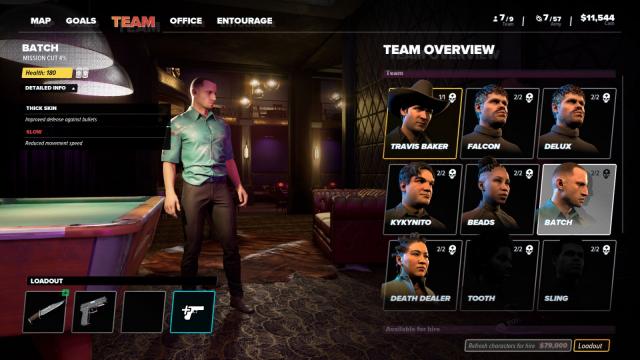
Small doesn't begin to describe some of these odd jobs either. Of course banks and jewelry stores have a longer setup and payoff akin to extended movie scenes; they're emulating coordinated smash-n-grabs. Then there are basic ones like… kill a nearby target and escape. Even stealthily completing it takes the time to toast a Pop Tart. The same goes for turf wars: you can reach the ten-soldier threshold and clear enemy attackers/defenders out in a couple of minutes. To hammer this point home, one of the best HQ features allows you to skip the first half of a bank robbery by spending soldiers for inter-gathering. So many missions are more like gameplay TikToks.
For all this guff thrown towards various activities, an outside observer may wonder when the meat of the actual campaign is up for a good 'ole skewering. The thing is... that's most of it. Since everything is just about Michael Madsen earning the crown, all extra story stuff is filler by design. A rival gang's latest batch of dope is just off-shore? Let's spend a few cutscenes laying out a plan. The only tangible narrative past that comes from certain team members. On occasion, these select few won't be able to participate in anything for the day due to their ongoing side mission. It's a neat concept to add dynamism to your crew rotation whilst humanizing those members. It's just a shame that the execution is a cluster of 'and then this happened…' style events, from acquiring a bomb to an ex-marine’s Vietnam flashbacks. The most repulsive team member would be the roided-up Jupiter though; with a personality and voice acting that makes me reflexively dry heave, Part II's Abby is like Audrey Hepburn by comparison.
Ah, but the poor delivery doesn't stop there. It's rather telling that after so many words have been spilled so few have been spent on Crime Boss' largest focus: the Hollywood cast. Part of that stems from a bland script replete with elementary-tier jokes like "fuck these ass-stains" and "make me a pizza!" towards some Italian thugs. If you're going to flop that hard, just emulate 90s Dennis Leary and steal better jokes for christsake. The rest of the blame goes to the rough voice acting for virtually everyone – in delivery and sound mixing. Grabbing all of these older stars sounds nice until the issue of the Uncanny Vocal Valley rears its ugly head; you're surrounded by what seem like middle-aged mobsters ready to crack skulls, yet practically everyone sounds like they need a throat lozenge and a nap. It’s bad enough to be ironically funny.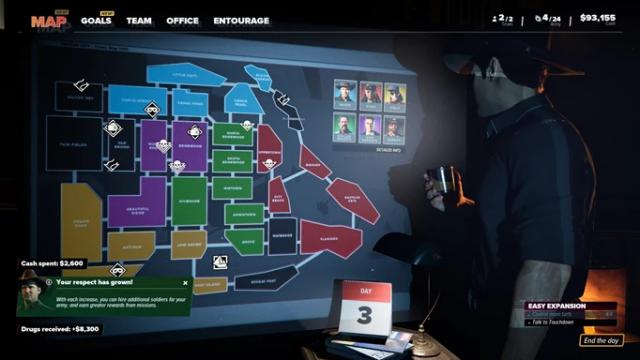
Despite so many seismic & occasionally funny fumbles, there are a few scant positives to note. The criminal enterprising mechanics are somewhat fulfilling. As the weight on Baker's shoulders grows so do the rewards. Daily wages from turf acquisitions are important passive income to then potentially invest in black-market weapons, acquiring more team members, starting missions, and so on. You can put yourself in an impecunious situation, even bankruptcy, if you act recklessly. Those early days feel like a war of attrition in people and finances. There's a delicate balance between hearty investment and taking important risks to squeeze out competitors. One of my favorite examples of this is finishing off an enemy faction. Even if Vanilla Ice's Chicos crew is pursuing five of your territories at once, overthrowing his final stronghold immediately remedies the issue. There could've been more complex crime-management dynamics, but it adequately captures the main title.
The go-to line of "better with friends" can also apply here, provided they're more reliable than the head trauma victims known as friendly AI. Crime Time consists of low-level campaign heists transplanted to a multiplayer server. Do you and potentially three other friends want to raid a few jewelry stores for easy cash? Then go have fun. Urban Legends is similar in kind to the campaign's micro-stories: a multi-part mission structure with the final level holding the biggest rewards. Unsurprisingly, they're all recycled campaign levels, but supplemented with different cutscenes, since the focus isn't on Baker. I'll admit it's… initially nice to see a competent team at work, but the effort to pair up without getting booted quickly wore me out; it's as though anything short of a fantastic connection guarantees you'll get booted to the main menu.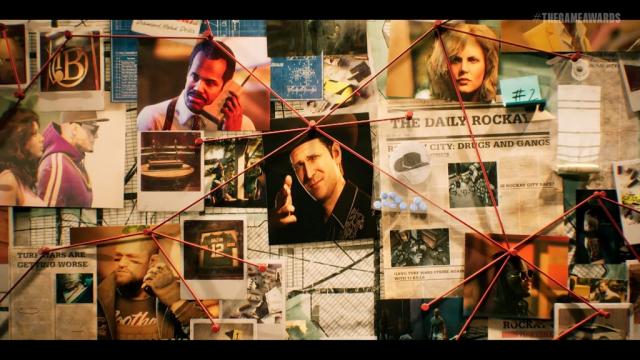
Crime Boss: Rockay City is a has-been roguelike mashed together with a has-been FPS that's mostly filled with has-been movie stars. There are so many minute details from top to bottom that make it nigh impossible to afford charitability to its writing, design, or overall taste. It's true that it works, in that bugs and other technical issues aren't plaguing the game. It can be finished and there are some salvageable crime enterprise mechanics to fiddle with, but everything surrounding that feels hollow and misguided. There's no other way to look at the rougelike elements than as a deliberate sham for its recycled content either. Perhaps it's fitting for that special kind of emptiness to come from a crime game; by the end of it, you'll have been viciously pilfered of both your time and money.
Contractor by trade and writer by hobby, Lee's obnoxious criticisms have found a way to be featured across several gaming sites: N4G, VGChartz, Gaming Nexus, DarkStation, and TechRaptor! He started gaming in the mid-90s and has had the privilege in playing many games across a plethora of platforms. Reader warning: each click given to his articles only helps to inflate his Texas-sized ego. Proceed with caution.









